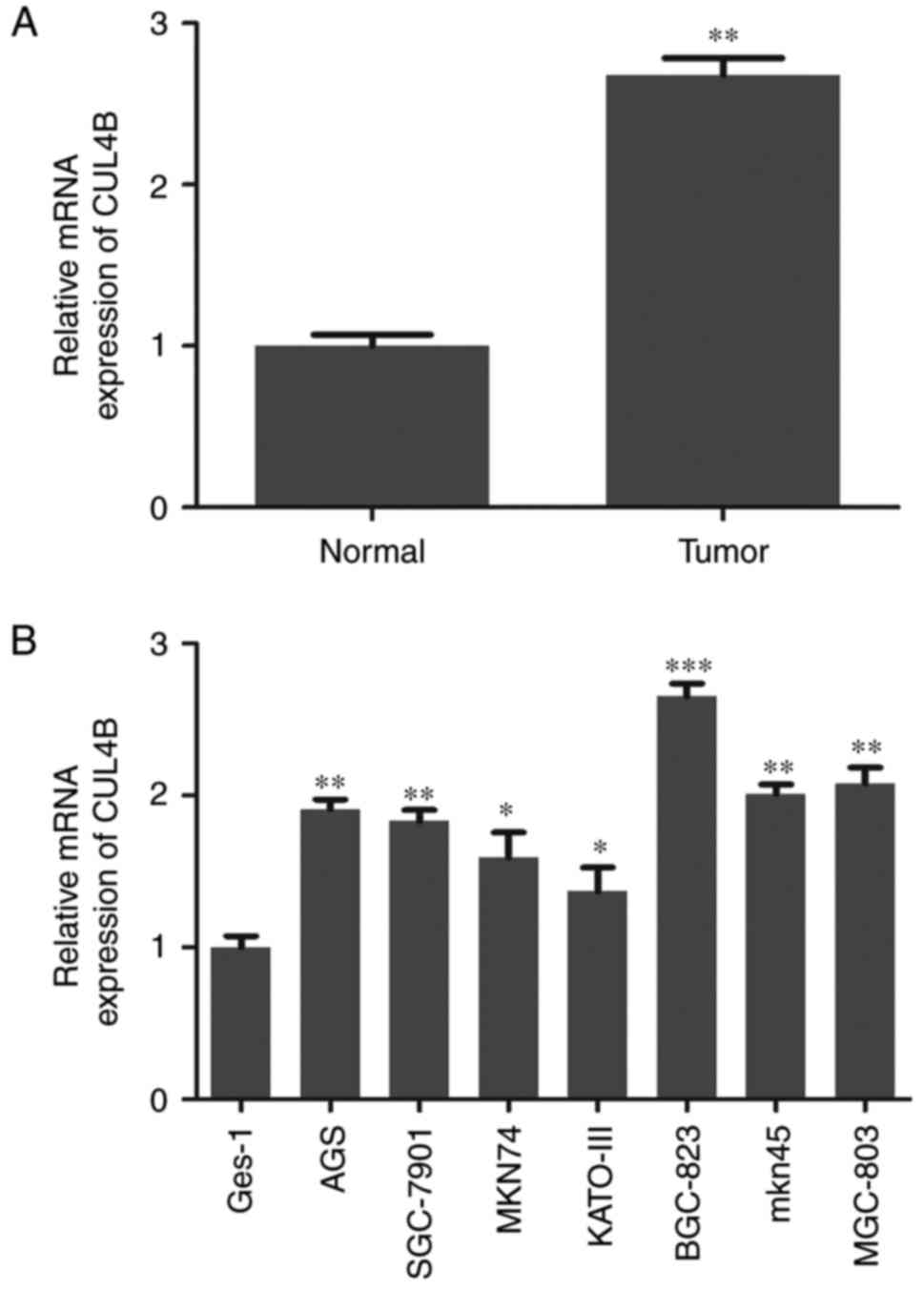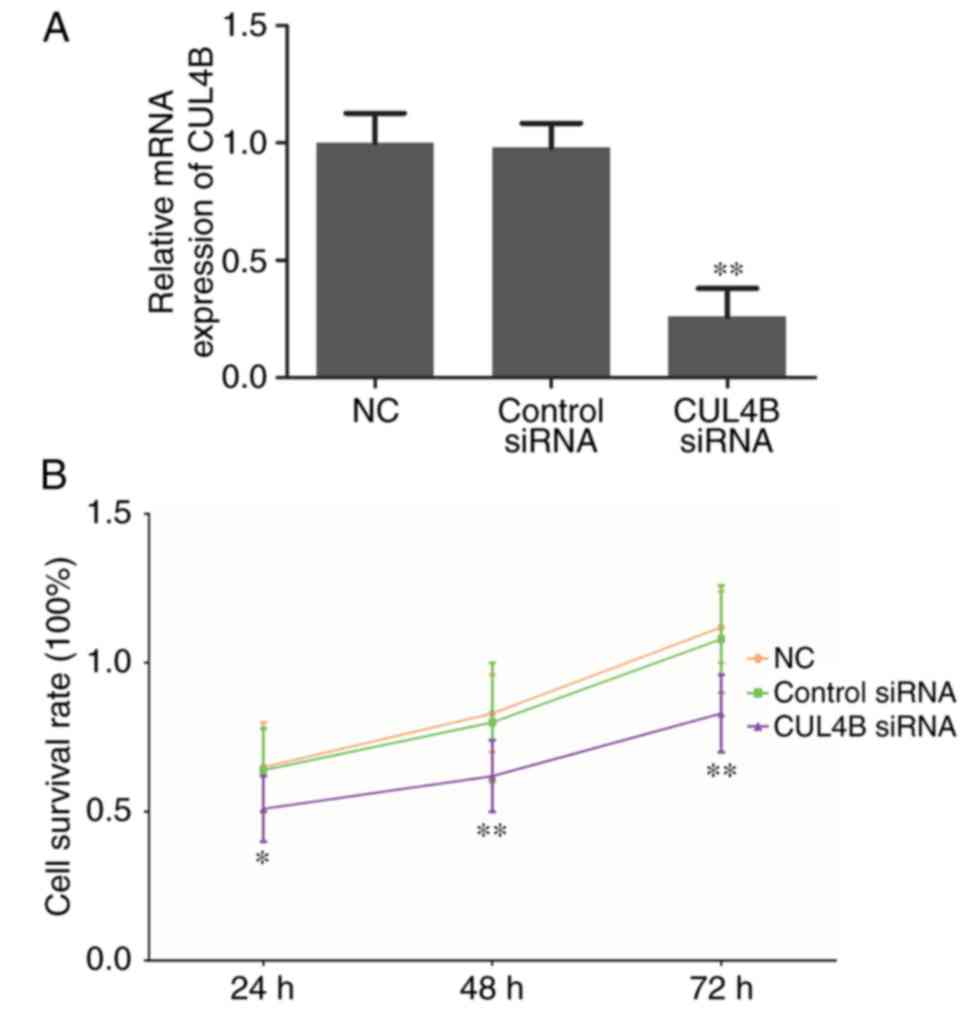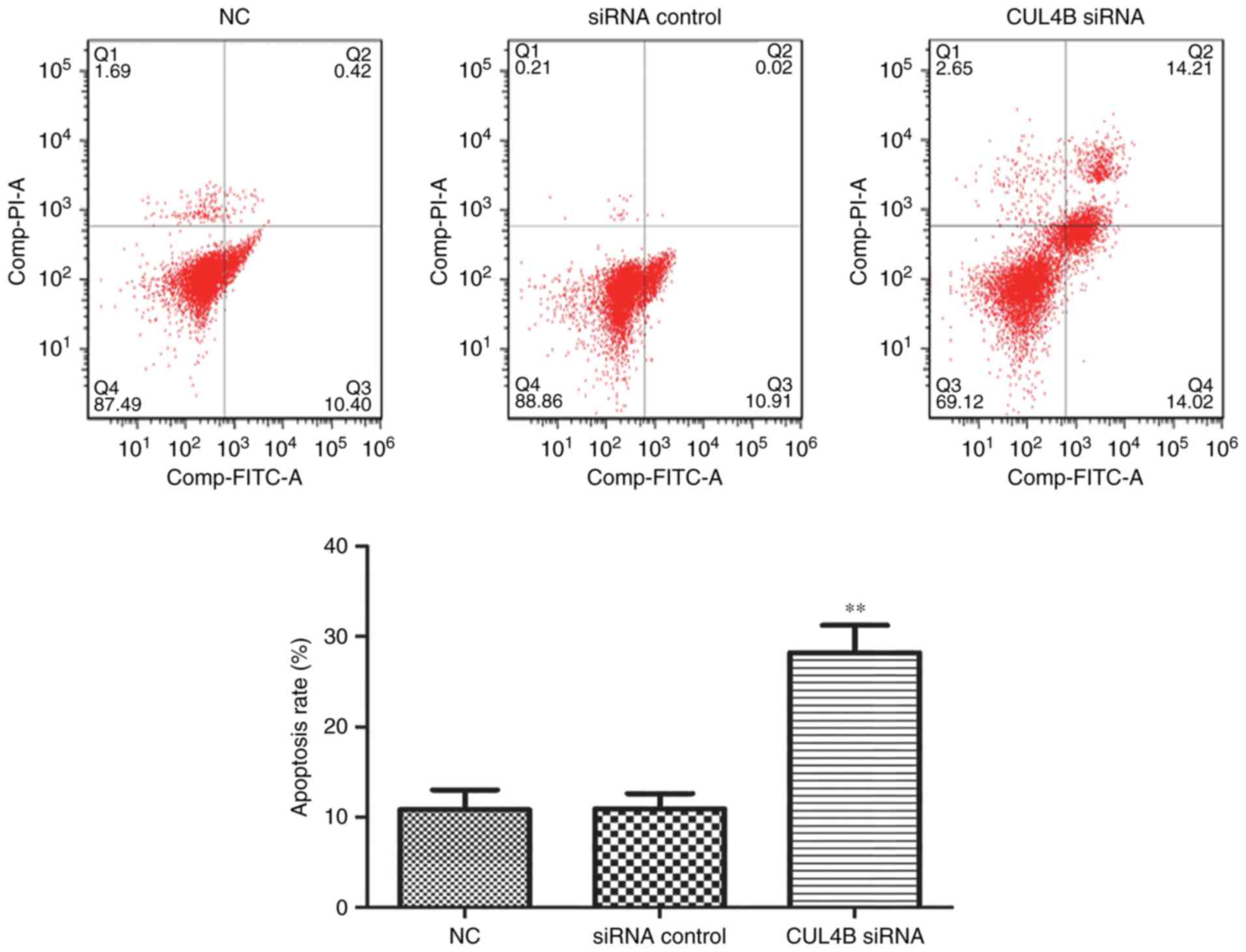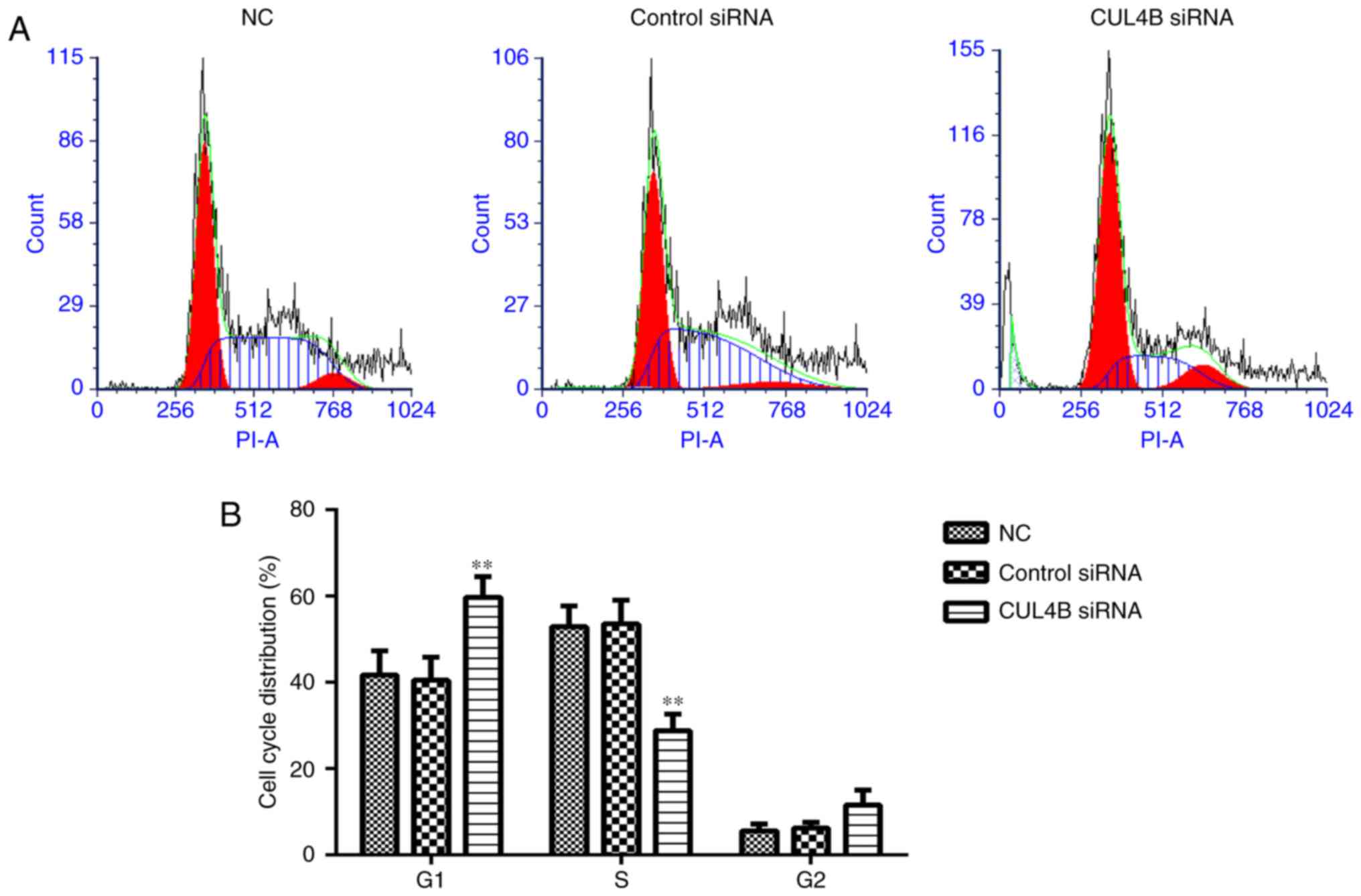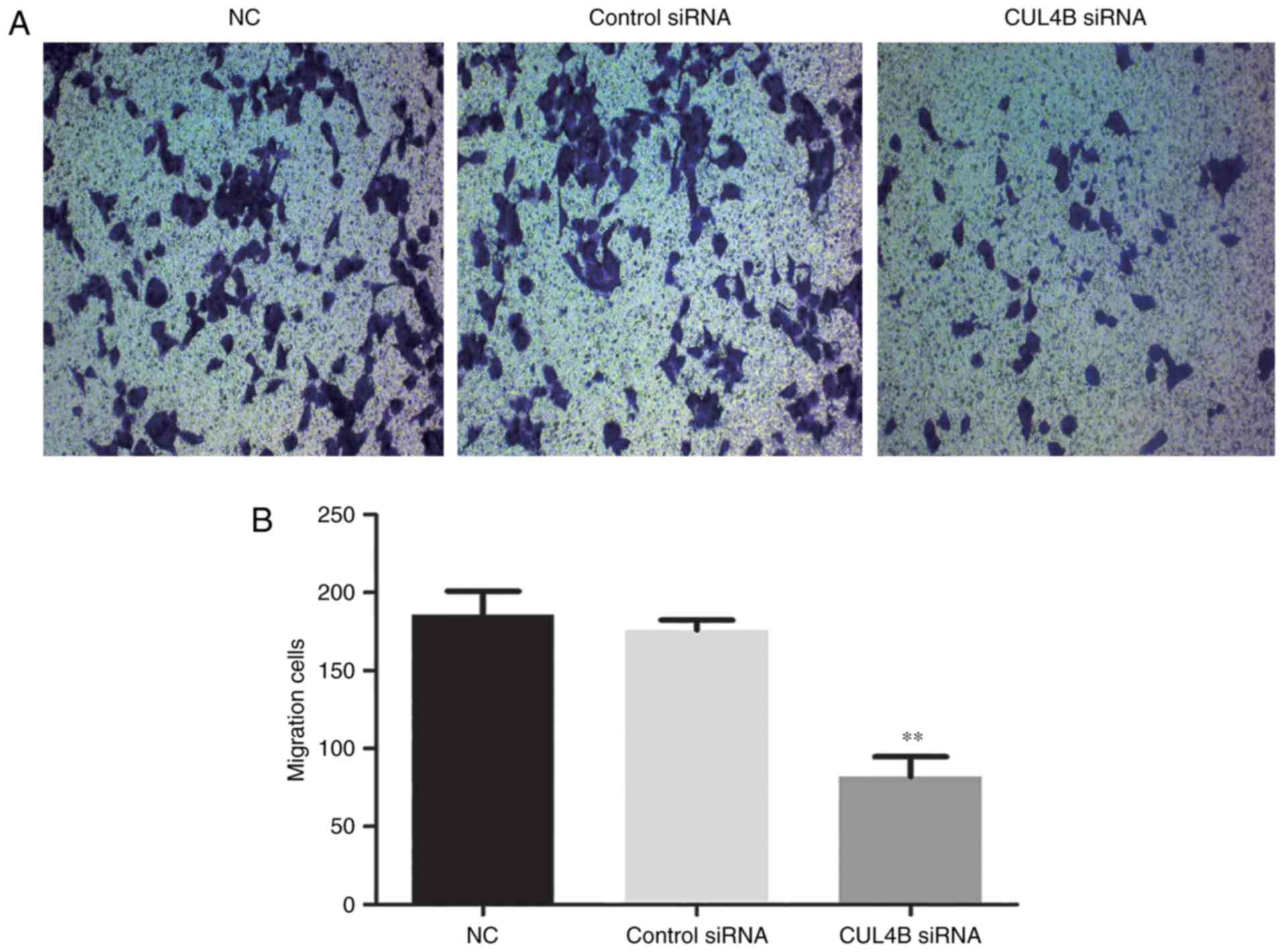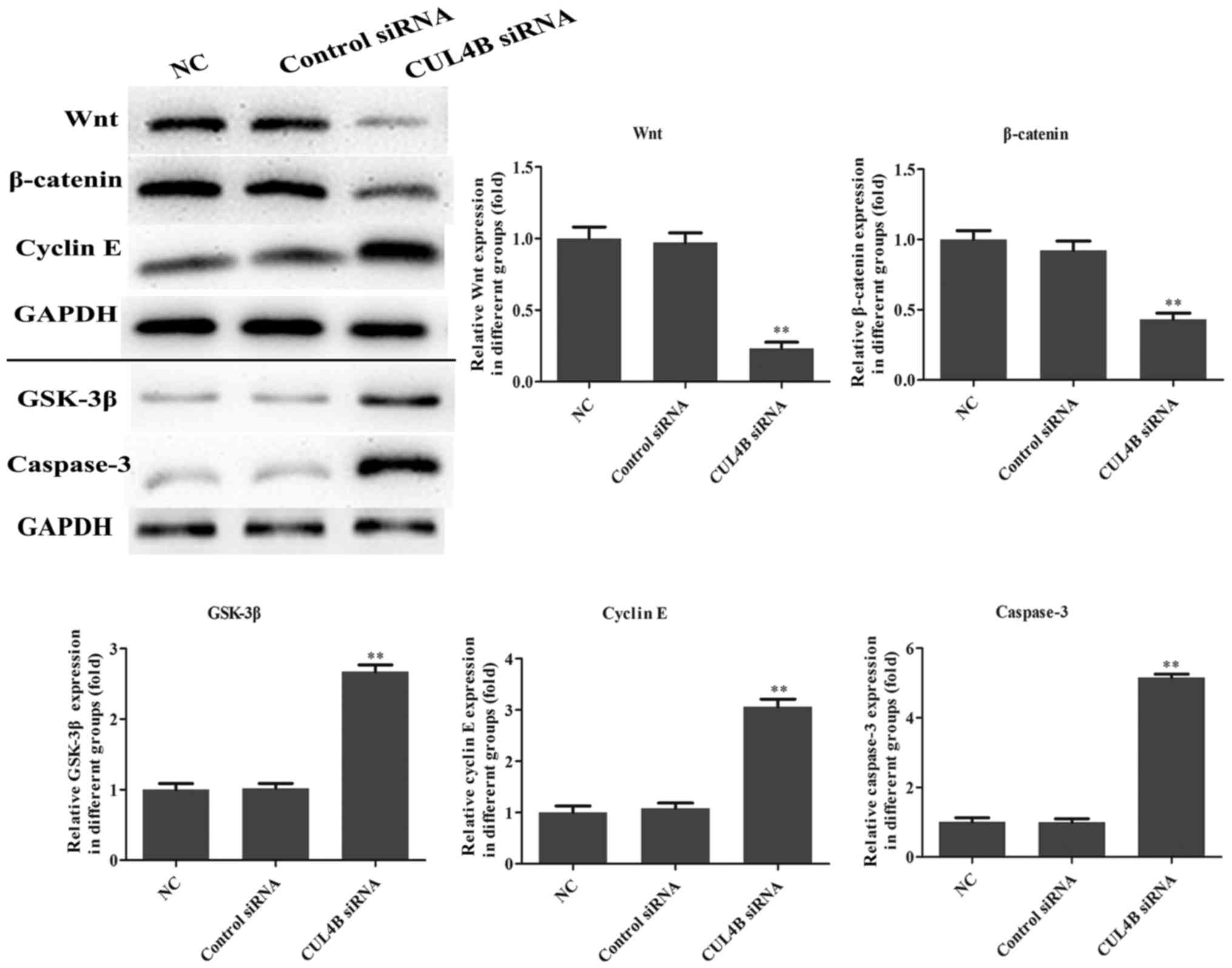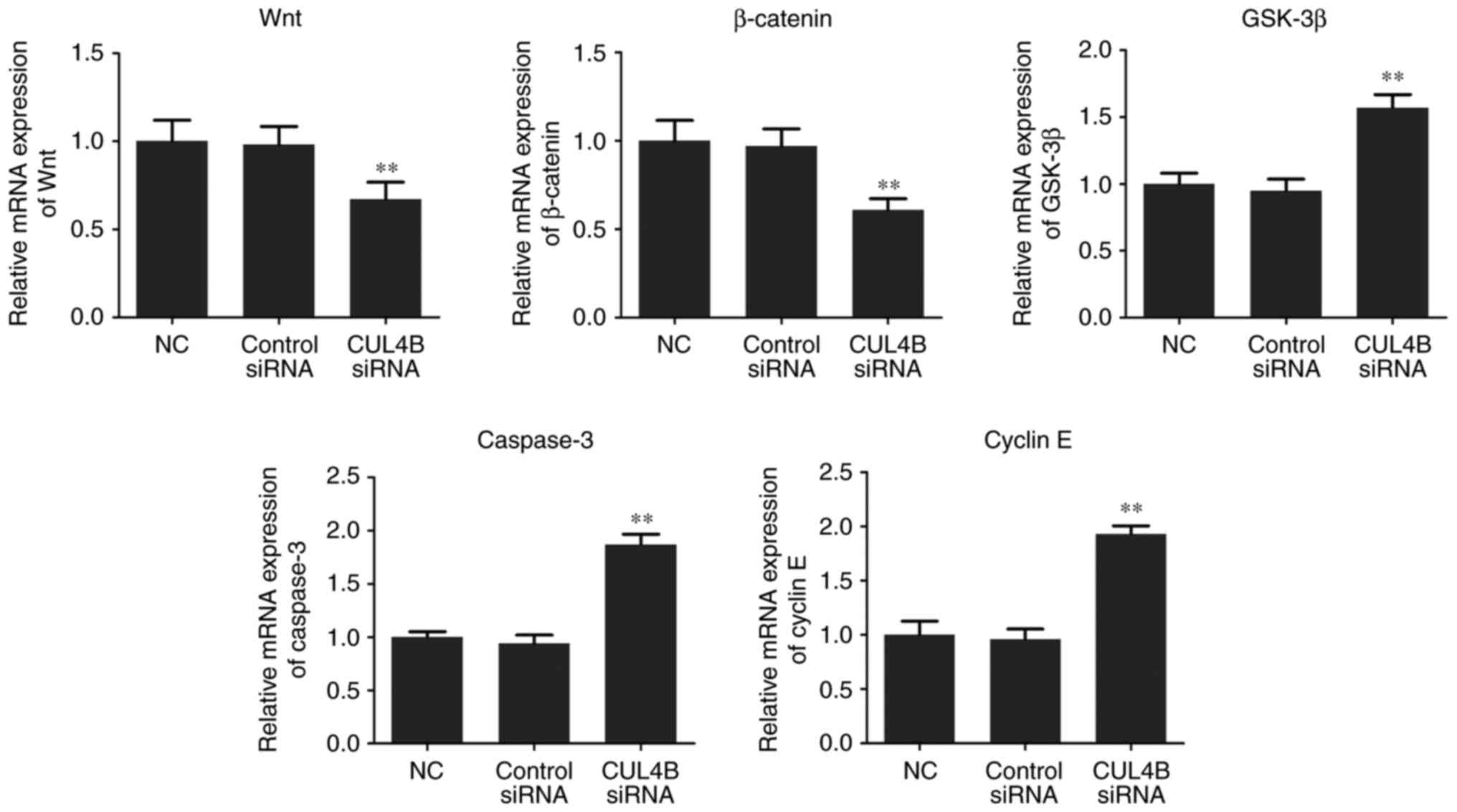|
1
|
Torre LA, Bray F, Siegel RL, Ferlay J,
Lortet-Tieulent J and Jemal A: Global cancer statistics, 2012. CA
Cancer J Clin. 65:87–108. 2015. View Article : Google Scholar : PubMed/NCBI
|
|
2
|
Yang L: Incidence and mortality of gastric
cancer in China. World J Gastroenterol. 12:17–20. 2006. View Article : Google Scholar : PubMed/NCBI
|
|
3
|
Fock KM and Ang TL: Epidemiology of
Helicobacter pylori infection and gastric cancer in Asia. J
Gastroenterol Hepatol. 25:479–486. 2010. View Article : Google Scholar : PubMed/NCBI
|
|
4
|
Jiang T, Tang HM, Wu ZH, Chen J, Lu S,
Zhou CZ, Yan DW and Peng ZH: Cullin 4B is a novel prognostic marker
that correlates with colon cancer progression and pathogenesis. Med
Oncol. 30:5342013. View Article : Google Scholar : PubMed/NCBI
|
|
5
|
Petroski MD and Deshaies RJ: Function and
regulation of cullin-RING ubiquitin ligases. Nat Rev Mol Cell Biol.
6:9–20. 2005. View
Article : Google Scholar : PubMed/NCBI
|
|
6
|
Liu HC, Enikolopov G and Chen Y: Cul4B
regulates neural progenitor cell growth. BMC Neurosci. 13:1122012.
View Article : Google Scholar : PubMed/NCBI
|
|
7
|
Ohtake F, Baba A, Takada I, Okada M,
Iwasaki K, Miki H, Takahashi S, Kouzmenko A, Nohara K, Chiba T, et
al: Dioxin receptor is a ligand-dependent E3 ubiquitin ligase.
Nature. 446:562–566. 2007. View Article : Google Scholar : PubMed/NCBI
|
|
8
|
Kerzendorfer C, Whibley A, Carpenter G,
Outwin E, Chiang SC, Turner G, Schwartz C, El-Khamisy S, Raymond FL
and O'Driscoll M: Mutations in Cullin 4B result in a human syndrome
associated with increased camptothecin-induced topoisomerase
I-dependent DNA breaks. Hum Mol Genet. 19:1324–1334. 2010.
View Article : Google Scholar : PubMed/NCBI
|
|
9
|
Tripathi R, Kota SK and Srinivas UK:
Cullin4B/E3-ubiquitin ligase negatively regulates beta-catenin. J
Biosci. 32:1133–1138. 2007. View Article : Google Scholar : PubMed/NCBI
|
|
10
|
Tripathi R, Sastry KS, Kota SK and
Srinivas UK: Cloning and characterization of mouse cullin4B/E3
ubiquitin ligase. J Biosci. 30:329–337. 2005. View Article : Google Scholar : PubMed/NCBI
|
|
11
|
Zou Y, Mi J, Cui J, Lu D, Zhang X, Guo C,
Gao G, Liu Q, Chen B, Shao C and Gong Y: Characterization of
nuclear localization signal in the N terminus of CUL4B and its
essential role in cyclin E degradation and cell cycle progression.
J Biol Chem. 284:33320–33332. 2009. View Article : Google Scholar : PubMed/NCBI
|
|
12
|
Higa LA, Yang X, Zheng J, Banks D, Wu M,
Ghosh P, Sun H and Zhang H: Involvement of CUL4 Ubiquitin E3
ligases in Regulating CDK inhibitors Dacapo/p27Kip1 and cyclin E
degradation. Cell Cycle. 5:71–77. 2006. View Article : Google Scholar : PubMed/NCBI
|
|
13
|
Chen Z, Shen BL, Fu QG, Wang F, Tang YX,
Hou CL and Chen L: CUL4B promotes proliferation and inhibits
apoptosis of human osteosarcoma cells. Oncol Rep. 32:2047–2053.
2014. View Article : Google Scholar : PubMed/NCBI
|
|
14
|
Yuan J, Han B, Hu H, Qian Y, Liu Z, Wei Z,
Liang X, Jiang B, Shao C and Gong Y: CUL4B activates Wnt/β-catenin
signalling in hepatocellular carcinoma by repressing Wnt
antagonists. J Pathol. 235:784–795. 2015. View Article : Google Scholar : PubMed/NCBI
|
|
15
|
Hu H, Yang Y, Ji Q, Zhao W, Jiang B, Liu
R, Yuan J, Liu Q, Li X, Zou Y, et al: CRL4B catalyzes H2AK119
monoubiquitination and coordinates with PRC2 to promote
tumorigenesis. Cancer Cell. 22:781–795. 2012. View Article : Google Scholar : PubMed/NCBI
|
|
16
|
Liebner S and Plate KH: Differentiation of
the brain vasculature: The answer came blowing by the Wnt. J
Angiogenes Res. 2:12010. View Article : Google Scholar : PubMed/NCBI
|
|
17
|
Liebner S, Czupalla CJ and Wolburg H:
Current concepts of blood-brain barrier development. Int J Dev
Biol. 55:467–476. 2011. View Article : Google Scholar : PubMed/NCBI
|
|
18
|
Ji H, Wang J, Nika H, Hawke D, Keezer S,
Ge Q, Fang B, Fang X, Fang D, Litchfield DW, et al: EGF-Induced ERK
activation promotes CK2-mediated disassociation of alpha-catenin
from beta-catenin and transactivation of beta-catenin. Mol Cell.
36:547–559. 2009. View Article : Google Scholar : PubMed/NCBI
|
|
19
|
Sareddy GR, Panigrahi M, Challa S,
Mahadevan A and Babu PP: Activation of Wnt/beta-catenin/Tcf
signaling pathway in human astrocytomas. Neurochem Int. 55:307–317.
2009. View Article : Google Scholar : PubMed/NCBI
|
|
20
|
Sareddy GR, Challa S, Panigrahi M and Babu
PP: Wnt/beta-catenin/Tcf signaling pathway activation in malignant
progression of rat gliomas induced by transplacental
N-ethyl-N-nitrosourea exposure. Neurochem Res. 34:1278–1288. 2009.
View Article : Google Scholar : PubMed/NCBI
|
|
21
|
Korur S, Huber RM, Sivasankaran B, Petrich
M, Morin P Jr, Hemmings BA, Merlo A and Lino MM: GSK3beta regulates
differentiation and growth arrest in glioblastoma. PLoS One.
4:e74432009. View Article : Google Scholar : PubMed/NCBI
|
|
22
|
Itoh T, Kamiya Y, Okabe M, Tanaka M and
Miyajima A: Inducible expression of Wnt genes during adult hepatic
stem/progenitor cell response. FEBS Lett. 583:777–781. 2009.
View Article : Google Scholar : PubMed/NCBI
|
|
23
|
Ji XK, Xie YK, Zhong JQ, Xu QG, Zeng QQ,
Wang Y, Zhang QY and Shan YF: GSK-3β suppresses the proliferation
of rat hepatic oval cells through modulating Wnt/β-catenin
signaling pathway. Acta Pharmacol Sin. 36:334–342. 2015. View Article : Google Scholar : PubMed/NCBI
|
|
24
|
Agarwal A, Das K, Lerner N, Sathe S, Cicek
M, Casey G and Sizemore N: The AKT/IkappaB kinase pathway promotes
angiogenic/metastatic gene expression in colorectal cancer by
activating nuclear factor-kappaB and beta-catenin. Oncogene.
24:1021–1031. 2005. View Article : Google Scholar : PubMed/NCBI
|
|
25
|
Su D, Hu X, Dong C and Ren J:
Determination of caspase-3 activity and its inhibition constant by
combination of fluorescence correlation spectroscopy with a
microwell chip. Anal Chem. 89:9788–9796. 2017. View Article : Google Scholar : PubMed/NCBI
|
|
26
|
Cowan CM, Thai J, Krajewski S, Reed JC,
Nicholson DW, Kaufmann SH and Roskams AJ: Caspases 3 and 9 send a
pro-apoptotic signal from synapse to cell body in olfactory
receptor neurons. J Neurosci. 21:7099–7109. 2001.PubMed/NCBI
|
|
27
|
Fu Z, Han X, Du J, Han X, Liu W, Shao S
and Liu X: Euphorbia lunulata extract acts on multidrug resistant
gastric cancer cells to inhibit cell proliferation, migration and
invasion, arrest cell cycle progression, and induce apoptosis. J
Ethnopharmacol. 212:8–17. 2018. View Article : Google Scholar : PubMed/NCBI
|
|
28
|
Lee H, Saini N, Parris AB, Zhao M and Yang
X: Ganetespib induces G2/M cell cycle arrest and apoptosis in
gastric cancer cells through targeting of receptor tyrosine kinase
signaling. Int J Oncol. 51:967–974. 2017.PubMed/NCBI
|
|
29
|
Alexander A, Karakas C, Chen X, Carey JP,
Yi M, Bondy M, Thompson P, Cheung KL, Ellis IO, Gong Y, et al:
Cyclin E overexpression as a biomarker for combination treatment
strategies in infammatory breast cancer. Oncotarget. 8:148972017.
View Article : Google Scholar : PubMed/NCBI
|
|
30
|
Boueroy P, Hahnvajanawong C, Boonmars T,
Saensa-Ard S, Anantachoke N, Vaeteewoottacharn K and Reutrakul V:
Antitumor efect of forbesione isolated from Garcinia hanburyi on
cholangiocarcinoma in vitro and in vivo. Oncol Lett. 12:4685–4698.
2016. View Article : Google Scholar : PubMed/NCBI
|
|
31
|
Li W, Zhang G, Wang HL and Wang L:
Analysis of expression of cyclin E, p27kip1 and Ki67 protein in
colorectal cancer tissues and its value for diagnosis, treatment
and prognosis of disease. Eur Rev Med Pharmacol Sci. 20:4874–4879.
2016.PubMed/NCBI
|
|
32
|
Butt AM, Raja AJ, Siddique S, Khan JS,
Shahid M, Tayyab GU, Minhas Z, Umar M, Idrees M and Tong Y:
Parallel expression profiling of hepatic and serum microRNA-122
associated with clinical features and treatment responses in
chronic hepatitis C patients. Sci Rep. 6:215102016. View Article : Google Scholar : PubMed/NCBI
|
|
33
|
Parkin DM, Whelan SL, Ferlay J, Teppo L
and Thomas DB: Cancer Incidence in Five Continents. VIII:IARC Sci
Publ. 1–781. 2002.
|
|
34
|
Lin Y, Ueda J, Kikuchi S, Totsuka Y, Wei
WQ, Qiao YL and Inoue M: Comparative epidemiology of gastric cancer
between Japan and China. World J Gastroenterol. 17:4421–4428. 2011.
View Article : Google Scholar : PubMed/NCBI
|
|
35
|
Yuan J, Han B, Hu H, Qian Y, Liu Z, Wei Z,
Liang X, Jiang B, Shao C and Gong Y: CUL4B activates Wnt/β-catenin
signalling in hepatocellular carcinoma by repressing Wnt
antagonists. J Pathol. 235:784–795. 2015. View Article : Google Scholar : PubMed/NCBI
|
|
36
|
Guichard C, Amaddeo G, Imbeaud S, Ladeiro
Y, Pelletier L, Maad IB, Calderaro J, Bioulac-Sage P, Letexier M,
Degos F, et al: Integrated analysis of somatic mutations and focal
copy-number changes identifies keygenes and pathways in
hepatocellular carcinoma. Nature Genet. 44:694–698. 2012.
View Article : Google Scholar : PubMed/NCBI
|
|
37
|
Aberle H, Bauer A, Stappert J, Kispert A
and Kemler R: Beta-catenin is a target for the ubiquitin-proteasome
pathway. EMBO J. 16:3797–3804. 1997. View Article : Google Scholar : PubMed/NCBI
|
|
38
|
You OH, Shin EA, Lee H, Kim JH, Sim DY,
Kim JH, Kim Y, Khil JH, Baek NI and Kim SH: Inhibition of
Sry-related HMg-Box Gene 10. Phytother Res. 8:2017.
|
|
39
|
Goto H, Inoko A and Inagaki M: Cell cycle
progression by the repression of primary cilia formation in
proliferating cells. Cell Mol Life Sci. 70:3893–3905. 2013.
View Article : Google Scholar : PubMed/NCBI
|
|
40
|
Liao K, Li J and Wang Z:
Dihydroartemisinin inhibits cell proliferation via
AKT/GSK3β/cyclinD1 pathway and induces apoptosis in A549 lung
cancer cells. Int J Clin Exp Pathol. 7:8684–8691. 2014.PubMed/NCBI
|
|
41
|
Shimura T: Acquired radioresistance of
cancer and the AKT/GSK3β/cyclin D1 overexpression cycle. J Radiat
Res. 52:539–544. 2011. View Article : Google Scholar : PubMed/NCBI
|















